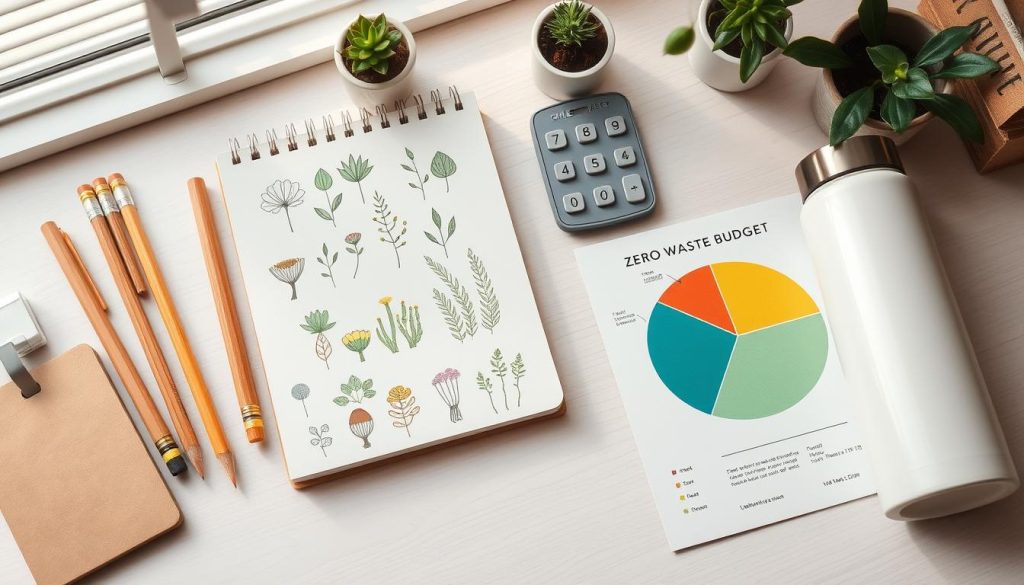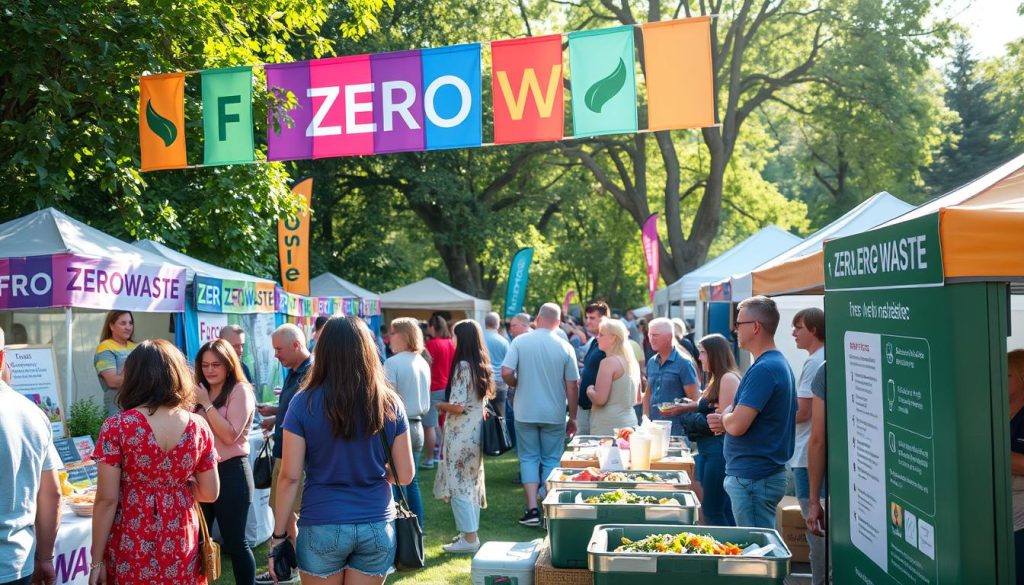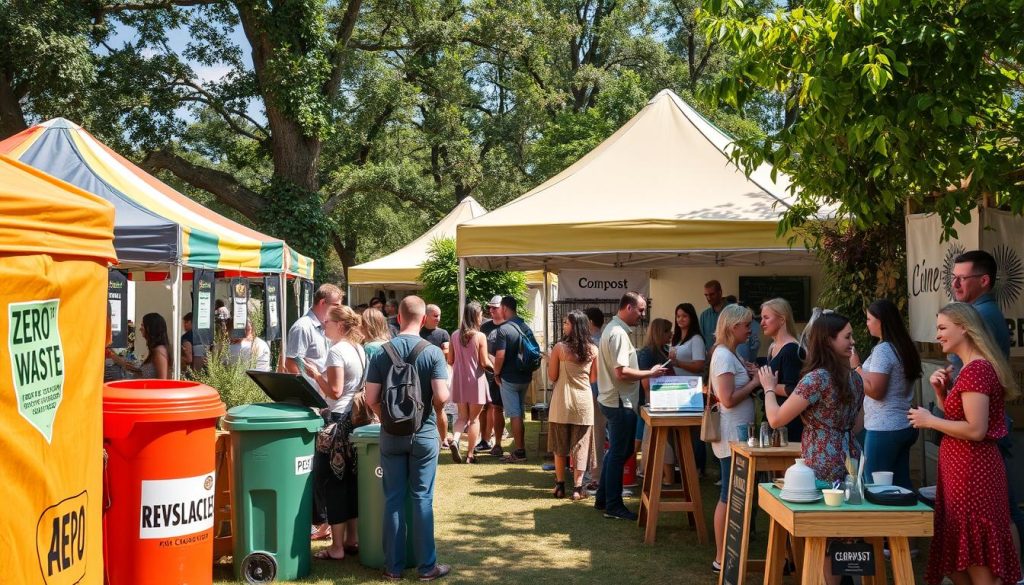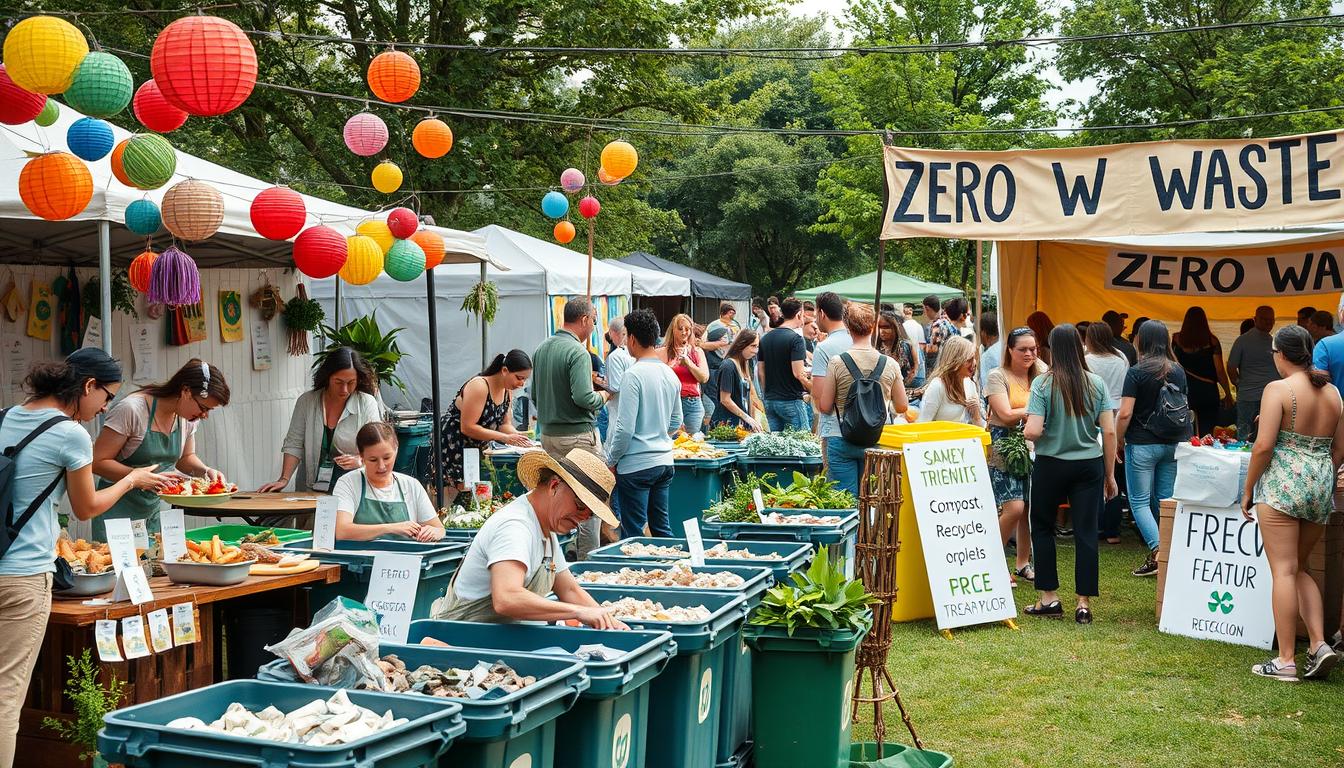As an event planner, I love creating experiences that are fun and good for the planet. I’m excited to share how to organize zero waste events. This article will cover the basics, benefits, and practical tips for eco-friendly gatherings.
Zero waste events change the game by using sustainable practices. They reduce waste, save resources, and teach people to care for the environment. By doing this, you can help the planet and attract people who care about the environment too.
In the next sections, we’ll dive into the main ideas of zero waste. We’ll look at the benefits of green events and give a detailed guide on planning, budgeting, and promoting them. Get ready to learn how to make your events sustainable and impactful.
Understanding Zero Waste Principles
Organizing eco-friendly gatherings means following zero waste principles. Zero waste aims to cut down waste and support sustainability from start to finish. By knowing these principles, event planners can make their events greener and reduce their environmental footprint.
What Does Zero Waste Mean?
Zero waste is about avoiding waste by reusing, recycling, and repurposing. It also means using fewer resources in the first place. For events, this means careful planning, choosing the right supplies, and managing waste well.
The Benefits of Going Zero Waste
- Reduced environmental impact: Zero waste helps save natural resources, cuts down on pollution, and lowers greenhouse gas emissions.
- Cost savings: Sustainable practices can save money in the long run by reducing waste disposal costs and the need for single-use items.
- Positive brand image: Hosting zero waste events shows your commitment to the environment. This can improve your reputation and attract eco-friendly attendees.
- Educating the community: Zero waste events are a chance to teach people about living more sustainably in their everyday lives.
By following zero waste principles, event organizers can host gatherings that are good for the planet. As more people look for green events, adopting zero waste can make your events stand out. It shows you’re a leader in sustainability.
Planning Your Zero Waste Event
Planning a zero waste event needs careful planning and knowing how to manage events sustainably. As an event planner, my main goal is to make sure the events I plan are good for the environment and don’t cost too much.
Setting Your Goals
The first thing to do when planning a zero waste event is to set clear goals. These goals should match the main ideas of sustainable event planning. This includes:
- Reducing waste
- Increasing recycling and resource use
- Lowering energy and water use
- Choosing eco-friendly materials and suppliers
- Getting people involved in green practices
Choosing the Right Venue
Finding the right venue is key for a successful green event. When looking at possible places, I check if they fit the bill for green events. I look at things like:
- How they handle waste and recycling
- Energy-saving features and green energy use
- Water-saving efforts and green landscaping
- How easy it is to get there by public transport or bike
- Their commitment to buying sustainable and ethically sourced things
By planning well and picking a venue that supports green events, I help my clients reduce their event’s impact on the environment. This way, we all work towards a greener future.
Creating a Sustainable Budget

Planning an eco-friendly event means you need to budget carefully. This ensures you can reduce waste without sacrificing the event’s quality. Look for ways to save money that also help the environment.
Identifying Cost-Effective Solutions
First, think about what your event really needs. Then, find alternatives to things that are usually thrown away. Choose items that can be reused or recycled, even if they cost more upfront.
Also, consider renting instead of buying. This can cut down on waste and save you money over time.
Sponsorship Opportunities
Getting sponsors who care about the environment can really help your budget. These sponsors might give you eco-friendly supplies or help pay for your green efforts. Look for local businesses and organizations that share your values.
With smart budgeting and the right sponsors, you can make your event both green and affordable. Your guests will appreciate the effort you put into making it sustainable.
Sourcing Eco-Friendly Supplies

Starting your journey to organize zero waste events is exciting. Finding the right eco-friendly supplies is key. By choosing the right vendors and alternatives, you can make your event sustainable and reduce waste.
How to Choose Vendors for Your Zero Waste Event
Choosing the right vendors is important. Look for companies that share your zero waste goals. Check their materials, how they make things, and how they ship. This ensures they meet your environmental standards.
- Prioritize local and small businesses that source their products responsibly.
- Ask vendors about their waste reduction and recycling practices.
- Seek out vendors that offer reusable, compostable, or recyclable alternatives to single-use items.
Alternatives to Disposable Items for Your Zero Waste Event
Getting rid of disposable items is crucial for a zero waste event. Choose reusable, compostable, or recyclable options instead. This reduces waste and shows your dedication to zero waste.
- Replace plastic cups, plates, and utensils with reusable or compostable options.
- Offer bulk food and beverage stations with reusable containers instead of individual packaging.
- Encourage attendees to bring their own water bottles and coffee mugs.
- Provide sustainable décor and signage that can be reused or recycled.
By picking eco-friendly vendors and using alternatives to disposable items, you can host zero waste events. These events focus on sustainability and help the environment.
Promoting Your Zero Waste Event

Organizing a zero waste event needs careful planning and smart promotion. Use social media and connect with your local community to spread the word. This way, you can inspire others to join the sustainable event planning movement.
Utilizing Social Media
Social media is a great tool for promoting your event. Create pages on Facebook, Instagram, and Twitter. Share updates, sneak peeks, and photos that show your green efforts.
Ask attendees to share their experiences and use hashtags like #ZeroWasteEvent or #SustainableEventPlanning.
Engaging with the Local Community
Connecting with your local community is key. Talk to local green groups, businesses, and organizations. Look for ways to work together, like joint events or eco-fairs.
By building these partnerships, you can reach more people and get more attendees for your event.
For your event to succeed, use social media and community connections. This approach will create excitement and inspire others to join the sustainable event planning movement.
Managing Waste During the Event
Organizing a zero waste event is more than planning. It’s about managing waste during the event too. By setting up waste stations and teaching attendees, we can reduce waste and lessen our environmental impact.
Setting Up Waste Stations
It’s important to have clear waste stations at the event. These should have bins for recycling, composting, and landfill waste. Use signs and instructions to help people know how to dispose of waste correctly.
Color-coded bins or visual cues can make it easier for everyone. This way, sorting waste becomes simple and straightforward.
Educating Attendees on Proper Disposal
Teaching attendees how to dispose of waste is crucial. Share waste management tips in your event materials, like signs and guides. Remind them often to encourage participation.
By teaching attendees, you create a team effort. This helps you achieve your zero waste goals more effectively.
Managing waste during the event is key to reaching your zero waste goals. By focusing on these steps, you’ll reduce your event’s environmental impact. You’ll also inspire people to live more sustainably every day.
Measuring Your Event’s Success
Hosting an eco-friendly event is a big achievement. But, the real test is in measuring its success. By collecting feedback and analyzing waste data, you can see how well your zero-waste plans worked. This helps you find ways to improve for future waste-free celebrations.
Collecting Feedback
It’s important to hear from your event attendees. Use surveys, interviews, and social media to get their thoughts. Ask about their experience with zero-waste efforts and how to make the next eco-friendly gathering better.
Analyzing Waste Reduction
Tracking your green event management success is key. Keep an eye on waste diverted, recyclables, and compostables. Compare these numbers to past events or industry standards to see how you’re doing.
Using feedback and waste data, you can make your future eco-friendly gatherings even better. This way, you keep moving towards a more sustainable event world.
Continuing the Zero Waste Journey
As we finish this amazing zero waste event, I feel a huge sense of pride and excitement. Today’s success is just the start of a long journey. I’m really looking forward to continuing it.
Encouraging Repeat Events
I want to make this zero waste event a regular thing. By doing this, we can keep growing and stay committed to being green. I’ll talk to our guests and sponsors to see if they want to help out next time. I’m sure we can make these events a big part of our community.
Inspiring Others to Go Zero Waste
But we’re not done yet. I want to inspire others to live zero waste too. I’ll share what we’ve learned with my friends and colleagues. I hope to encourage them to start their own green projects. Together, we can make a big difference and help more people live sustainably.

